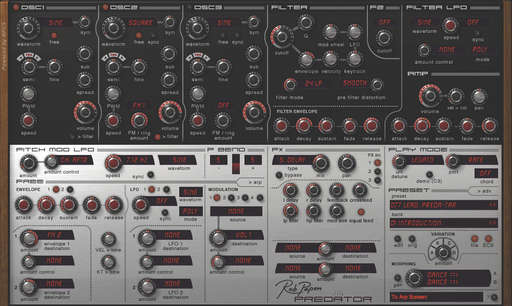MusicRadar Verdict
This third Papen-branded synth is a fine instrument indeed. The great presets will draw you in, but there's plenty here to keep you interested for many months to come.
Pros
- +
Excellent sound quality. Monster modulation possibilities. All those waveforms. Cool arpeggiator. Papen's patches are great.
Cons
- -
We'd love to modulate the waveform selection! Some arp patterns are overused in the presets.
MusicRadar's got your back
As a long-time patch designer for some of the most popular synths on the planet, Rob Papen knows how to squeeze amazing sounds from any synth he touches. More than that, he knows exactly what he needs from a synthesizer in order to create his much sought-after tones.
Rob previously worked with LinPlug to bring us the wildly popular Albino. Now he's releasing his second collaboration with Jon Ayres of ConcreteFX fame (the pair previously conspired to bring us Blue).
The freshly minted Predator is a three-oscillator hybrid synth that runs on both Mac and PC. It comes in VST, RTAS and AU flavours and costs a very reasonable £99. This starts to seem like chicken feed when you consider the big, ballsy sound this instrument offers.
Overview
On the surface, Predator's feature set looks very familiar: three oscillators are pumped through a multimode filter and a handful of modulation sources. These functions are augmented by an assortment of effects and the now-obligatory arpeggiator.
Given this rather pedestrian signal path, it's not terribly challenging to put Predator through its paces with a minimum head-scratching.
However, you shouldn't be fooled by this apparent simplicity: the devil, as they say, is in the details, and it's only when you start poking the parameters that Predator's powerful punch really becomes apparent.
Let's look again at those oscillators. No mere virtual wannabes, these pack a whopping 128 waveforms. Naturally, some are based on the standard saw, square and sine waves we know and love, but the majority draw on additive or spectral synthesis to produce a sizzling sonic palette that sounds decidedly modern.
Want all the hottest music and gear news, reviews, deals, features and more, direct to your inbox? Sign up here.
But it doesn't end with the waveforms. Predator offers pulse width modulation (with a dedicated LFO, no less), frequency and ring modulation and a sub oscillator to boot. What's more, you can control the symmetry of each wave.
Oscillators have a free-running mode and the second and third oscillators can be synced to the first. Oh, and you get noise generators, too.
Turn your attention to the main filter and you're transported back to Retroville. This is a multimode affair that offers 6dB, 12dB, 18dB and 24dB low- and high-pass filtering, and 12dB and 24dB band-pass, notch and comb filters. Cutoff and Q knobs are provided, as is a dedicated five-stage envelope generator.
A dedicated filter LFO with all the trimmings is tucked in there, as is a pre-filter distortion that offers convincing, edgy crunch. Another nice touch is the dedicated control for determining how much effect the mod wheel has on the filter.
Harking back to Roland's classic Juno series, Predator also throws a second filter iunto the signal path. This, too, is a multimode model, but includes just a lone cutoff knob.
As you'll see from the screenshots, Predator sports heaps of modulation sources. As well as the expected amp envelope (five stages) and the aforementioned dedicated LFOs and envelope generators, a selection of 'Free Modulation' sources are available too.
These include dual five-stage envelopes and another pair of LFOs, each of which can be routed to any of the 44 modulation destinations. When we saw that Predator was a joint venture with ConcreteFX, we hoped that oscillator waveform selection would be among the mod destinations (this facility was available in Kubik, their spiffy wavetable synth).
Alas, this turns out not to be the case, though you can kludge some classic wavetable effects by using Predator's MIDI routing to assign a MIDI controller to the Waveform pot. Predator certainly isn't a synth that does things by halves, and this is evident when you consider its built-in effects processing.
This goes far beyond the normal smattering of delays and choruses: you can choose from a total of 21 effects, each of which has its own specific set of controls.
Waveshaping, ensemble, filtering and more are to be found within, and there's plenty more besides. We're delighted (and slightly surprised) to be able to report that all of the effects are actually pretty good.
Superficially, Predator offers nothing you might consider new or innovative. Sometimes, though, the whole is far greater than the sum of its parts.
This is definitely the case here: by presenting the user with so many tasty waveforms and ways in which to modulate them, Papen and Ayres have managed to create something that's simultaneously familiar, friendly, complex and flexible.
Sounds
It's easy to forge sounds of real depth and sophistication without getting sidetracked by arcane algorithms and impenetrable parameters. Needless to say, Predator comes packed with a plethora of presets from Papen himself.
Thoughtfully categorised, the factory set focuses squarely on modern styles, though it's quite easy to find sounds that fit in with any genre you like. Even the effects processing is tastefully applied - something of a rarity in a soft synth!
So obviously, we dig Predator. It's powerful, easy to get into and sounds awesome. Given that sub-£100 price tag, we'd say it's a no-brainer for dance musicians and a must-try synth for anyone else.
Computer Music magazine is the world’s best selling publication dedicated solely to making great music with your Mac or PC computer. Each issue it brings its lucky readers the best in cutting-edge tutorials, need-to-know, expert software reviews and even all the tools you actually need to make great music today, courtesy of our legendary CM Plugin Suite.

